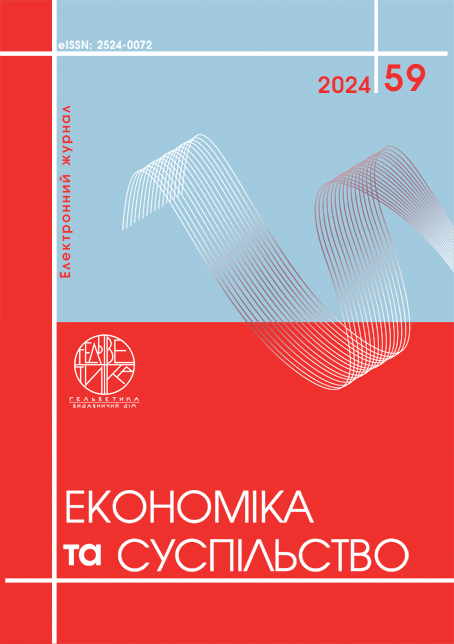DEFINING THE TERM "PROFIT" IN ECONOMIC SCIENCE
Abstract
The article is devoted to the study of definitions of the category "enterprise profit". The purpose of this article is the analysis of theoretical aspects of the company's profit and the development of an algorithm for optimizing the management of the company's profit in the conditions of a military-economic crisis. The analysis of scientific publications confirms that the interest of scientists in the problems of a comprehensive interpretation of the concept of enterprise profit is relevant in Ukraine. The main interpretations of profit by world scientists and Ukrainian economists were analyzed and an evolutionary paradigm was developed, which substantiates the changing development of different points of view in relation to the level of development of the economic system in which enterprises operate. Key factors affecting corporate earnings are examined, including economic activity, market conditions, tax rates, monetary and fiscal policy, technological change, stability of the political environment, and government policy. The interaction of these factors and their impact on the size and stability of profit is indicated. The interaction of factors affecting profit and their impact on its size and stability is considered. The most promising directions for improving the interpretation of profit, taking into account the challenges of modern times in the context of the economy of ecological development, have been identified and analyzed. The article examines various aspects and definitions of the company's profit, taking into account its essence in the context of economic benefit. A scheme of factors affecting the size and stability of profit has been created. Profit is key to the financial stability and development of the enterprise, providing an opportunity to invest in new technologies and research. The expediency of taking into account the factors affecting the size of the profit is emphasized as an important aspect of management. The text examines different views of economic schools on the essence and definition of profit in modern conditions. It is noted that the accounting definition of profit, which is based on the difference between revenues and related costs. The distinction between accounting and economic profit is indicated, where economists use the latter to determine the economic success of an enterprise. The need to clarify and develop the given definitions of profit in further research is noted. Further research is important for the adaptation of Ukrainian financial accounting to international standards, especially in the context of Ukraine's accession to the European Union.
References
Положення (стандарт) бухгалтерського облiку 15 «Дохiд», затверджено наказом Мiнiстерства фiнансiв України від 29.11.99 № 290. URL: http://www.minfin.gov.ua.
Андрусь О.І. Фактори та система формування прибутковості підприємства. за ред.О.І. Андрусь, С.Ю. Пятаченко Економіка і суспільство. Вісник мукачівського державного університету. Мукачево: 2022. С.233¬240
Денисенко Л.О., Кучерявенко Ю.О. Шляхи поліпшення процесу управління прибутком на підприємстві за.ред.Л.О. Денисенко, Ю.О. Кучерявенко // Проблеми економіки організації та управління підприємствами. Вісник КНУТД. 2014.№ 1.С. 145–152.
Гетьман О.О., Шаповал В.М. Економіка підприємства : [навч. посіб. для студ. ВНЗ]. Київ : Центрнавчальної літератури, 2006.488 с.
О.Є. Майборода, Г. О. Сукрушева, Є. В. Куліш. Теоретична сутність категорії «прибуток підприємства» Економіка і суспільство, С.310¬313
Тульчинська С.О., Солосіч А. Актуальні проблеми підвищення прибутковості комунальних підприємств як фактору економічної безпеки. Агросвіт. 2019. № 22. С. 54¬59.
Терещенко В. М. Управління прибутком підприємства.Збірник тез Ⅹ Всеукраїнської студентської науково-технічної конференції „Природничі та гуманітарні науки. Актуальні питання“, 25-26 квітня 2017 року. — Т. : ТНТУ, 2017. — Том 2. — С. 46–47. — (Економіка, менеджмент, фінанси).
Polozhennia (standart) bukhhalterskoho obliku 15 «Dokhid»( 1. Provisions (standard) of accounting 15 "Income"), zatverdzheno nakazom Ministerstva finansiv Ukrainy vid 29.11.99 № 290. URL: http://www.minfin.gov.ua.
Andrus O.I. (2022) Faktory ta systema formuvannia prybutkovosti pidpryiemstva [Factors and system of formation of profitability of the enterprise]. za red.O.I. Andrus, S.Iu. Piatachenko Ekonomika i suspilstvo. Visnyk mukachivskoho derzhavnoho universytetu. – Mukachevo: S.233¬240
Denysenko L.O. (2014) Kucheriavenko Yu.O. Shliakhy polipshennia protsesu upravlinnia prybutkom na pidpryiemstvi [Ways to improve the profit management process at the enterprise] za red. L.O. Denysenko, Yu.O. Kucheriavenko // Problemy ekonomiky orhanizatsii ta upravlinnia pidpryiemstvamy. Visnyk KNUTD.№ 1. – S. 145–152.
Hetman O.O. (2006) Shapoval V.M. Ekonomika pidpryiemstva [Business Economics] : [navch. posib. dlia stud. VNZ]. – Kyiv : Tsentrnavchalnoi literatury, 488 s.
O.Ye. Maiboroda, H.O. Sukrusheva, Ye.V. Kulish. Teoretychna sutnist katehorii «prybutok pidpryiemstva» [The theoretical essence of the "enterprise profit" category] Ekonomika i suspilstvo, S.310¬313
Tulchynska S.O., Solosich A. Aktualni problemy pidvyshchennia prybutkovosti komunalnykh pidpryiemstv yak faktoru ekonomichnoi bezpeky(Actual problems of increasing the profitability of utility enterprises as a factor of economic security.). Ahrosvit. 2019. № 22. S. 54¬59.
Tereshchenko V.M. Upravlinnia prybutkom pidpryiemstva [Enterprise profit management]. Zbirnyk tez Ⅹ Vseukrainskoi studentskoi naukovo-tekhnichnoi konferentsii „Pryrodnychi ta humanitarni nauky. Aktualni pytannia“, 25-26 kvitnia 2017 roku. — T. : TNTU, 2017. — Tom 2. — S. 46–47. — (Ekonomika, menedzhment, finansy).

This work is licensed under a Creative Commons Attribution 4.0 International License.


